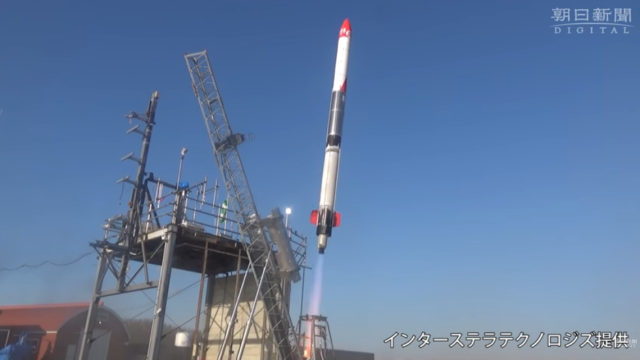Aerospace company Interstellar Technologies Inc. became the first private firm in Japan to launch a rocket into space on Saturday, per the Japan Times, by sending an unmanned, 10-meter, one-ton Momo-3 rocket some 110 kilometres upwards on a brief but milestone hitting journey.
This is the third launch attempt by Interstellar. A 2017 launch resulted in operators losing contact with the rocket after launch, though the rocket was estimated to have achieved a total height of around 20 kilometres.
Another in 2018 resulted in a massive fireball when the rocket left the pad, then within seconds fell back down and exploded.
Saturday’s attempt was originally scheduled for last week, but a “glitch in the fuel system” forced a delay, according to the Times. Saturday’s originally planned launch at 5:00 a.m. local time was also delayed by 45 minutes after the detection of an “anomaly.”
However, when it did launch everything worked as intended, with the Momo-3 rocket burning its liquid fuel for the scheduled two minutes and flying for 10 minutes before it fell into the Pacific Ocean. The rocket reportedly carried a 20 kilogram payload that was not delivered to space, but instead carried testing equipment.
Company founder Takafumi Horie told the Times the launch on Saturday was a “complete success,” adding “We’ll work to achieve stable launches and mass-produce (rockets) in quick cycles.”
This is probably a big relief for Horie, the creator of now-defunct internet service provider Livedoor. His credibility has been somewhat thrown into question due to his history with that company, which crashed and burned last decade amid a trading scandal that saw him land nearly two years in jail.
Some of Horie’s more ambitious efforts, such bids to take over a baseball team and a major media conglomerate as well as a run for parliament, have also ended in failure.
As noted in Nikkei Asian Review, Horie’s plans for Interstellar are relatively modest and he has no plans to compete with aerospace giants like SpaceX or Blue Origin, instead focusing on small, cheap rockets that cost under a million dollars.
However, its primary competitor Rocket Lab has more resources to expend and achieved a successful space launch in 2009 (and first launched a satellite in January 2018), while other companies like China’s OneSpace are making considerable progress.
As Nikkei separately reported this weekend, Interstellar’s launch is also a step towards a new era in which private companies, historically overshadowed by the Japan Aerospace Exploration Agency, take a bigger role in the nation’s space efforts.
Interstellar plans to develop another rocket, a larger Zero model that can deliver microsatellites into orbit, but it will require tens of millions of dollars in development costs. That means the company “not be able to rely on such homespun methods as crowdfunding it has been using to raise capital,” Nikkei added.
